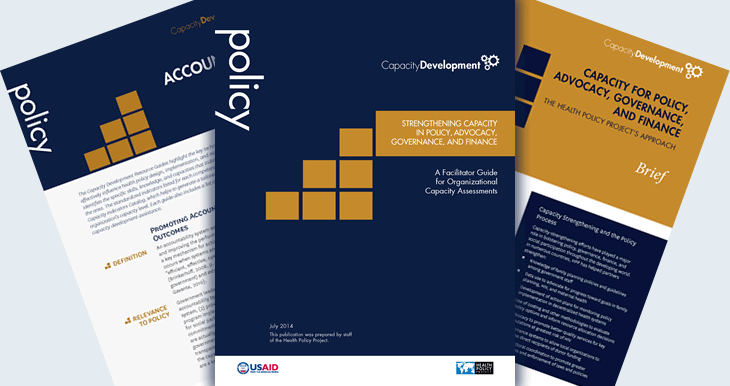The Health Policy Project ended in 2016. Work continued under Health Policy Plus (HP+) until 2022.
NEWS & VIEWS

By Ann Hendrix-Jenkins
Capacity development has emerged as a discrete discipline. It started out simply, mostly as a sound intention, and then somehow became a synonym for “training.” But neither of those has proved sufficient; as international development rapidly changes, so has this evolving—and increasingly indispensable—discipline. More than ever, development investments are expected to yield lasting, transformative change in additional to fruitful short-term results. This tall order calls for multi-level programming that attends simultaneously to both immediate and sustainable impact.
For the past five years, USAID’s Health Policy Project has been working on both levels. As we’ve supported measurable improvements in policy, advocacy, finance and governance around the world, we’ve also been collaborating with subnational, national, regional, and international partners to enable capacity that can continue to foster progress after we are gone.
How have we fostered this “meta” progress toward sustainability, in the form of increased capabilities? For starters, our capacity development mechanisms employ a wide array of approaches, based on evidence of what enables systems, organizations, and individual people to learn and grow.
We recognize that working within complex systems calls for capacity to adapt to unforeseen developments. The systems perspective helps contextualize our partnerships with individual, organizational and government entities within both time and space: within their societies (cultures, economies, politics, natural environments) as well as at this point in time of their history and careers. While complex to contend with, we all understand that these larger systems are what ultimately determine health and development outcomes.
We also work from evidence showing that organizations and people truly learn, and change takes root, when interventions utilize an array of effective approaches, including facilitated self-assessments leading to self-determined goals and self-managed action plans. We employ on-the-job training and offer international technical support, as well as peer- and colleague-based approaches including seconding, mentoring, coaching, twinning, study tours and more.
Finally, like other disciplines, we capacity development practitioners “treasure what we measure.” The perils of monitoring and evaluation of capacity development are many. They run the gamut from broad efforts to delineate attribution (at best) within complex systems, to the narrowest focus on the internal checklists of organization or individuals accomplishments. As with most international development disciplines, the best answer lies somewhere in the middle, drawing from a combination of quantitative and qualitative approaches that help us assess progress as well as capture practical knowledge to inform this young discipline.
At the Health Policy Project we have taken these responsibilities seriously, producing a host of tools, resources and documentation designed to contribute to the larger field, as well as the distinct niche of capacity development for policy and advocacy.
What's New
- Something to Build On: “Innovation Exchange” Celebrates the Health Policy Project’s Close and a New Beginning
- What Will it Take for Tanzania to Achieve ART Targets and Ensure Long-Term Sustainability of the HIV Response?
- Helping Kenya’s County Leaders Advocate for Increased Health Investments
- HPP Holds Working Meeting on Ensuring Responsible PEPFAR Transitions for Key Populations
- Health Policy Project Celebrates 2016 International Women's Day
- HPP Staff Participate in White House Conference on HIV Stigma Reduction

